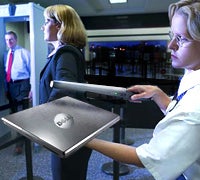 |
The oft-maligned Transportation Security Agency (TSA) has earned a reputation for maddening overreach, confiscating fingernail clippers, tweezers and assorted benign implements on the grounds they could be used to hijack an airplane.
For the most part, these stories are amusing, and for many travelers, another case of government ineptitude. For international travelers, however, the problem is much more serious. Customs rules grant Customs and Border Protection (CBP) agents intrusive powers that could be considered a civil rights violation in other countries.
The government’s position appears to be that you have no right to know what the rules are, despite a Freedom of Information Act (FOIA) request by the Electronic Frontier Foundation (EFF) and repeated attempts by a Florida law firm to find out.
Federal courts so far agree with the government. In late April, the 9th Circuit Court of Appeals held that a “reasonable suspicion is not needed for customs officials to search a laptop or other personal electronic storage devices at the border” and overturned a lower court ruling that found laptop searches by Customs violated the Fourth Amendment against unlawful search and seizure.
Not all victims of government outreach are sympathetic figures, however. The southern California man in the case above had his laptop checked on a return trip from the Philippines and Customs found a stash of child pornography.
The case, USA vs. Arnold, is being appealed to a full-court hearing, so all 11 judges of the 9th Circuit would hear the case instead of the four who originally heard it. If that fails, the case could then appeal to the Supreme Court, which frequently overturns 9th Circuit decisions.
Attorney Caleb Sullivan of the firm Becker & Poliakoff adds that the Customs department can more or less go on fishing expeditions with no justification.
The Customs and Border Patrol office did not respond to requests for comment by InternetNews.com.
“What the lawyers are trying to work out in the various cases is to come to some definition with what level of suspicion these agents must have to engage in the search in the first place,” Sullivan told InternetNews.com.
“The government’s position is they don’t need any, because laptops are like suitcases,” he added. “They have made that argument that it’s just another container.”
These rules apply only to overseas travel, not U.S. travel, Sullivan said. He added that anecdotally, he hears that people at the border will be asked to not only power on the laptop, which the TSA does and stops at that point, but Customs goes further. It will boot the machine, look at files and folders and can take the laptop outright or even copy data off it.
It’s not just business travelers being hit. One client of Becker & Poliakoff said her children’s laptops were searched. “That to me seems particularly egregious and far-fetched. But it’s happening, and it seems to be happening with increasing frequency, which is why it has everyone’s attention,” Sullivan said.
Similar stories reached the ears of the EFF and Asian Law Caucus, a San Francisco group representing the city’s sizable Asian population.
EFF staff attorney Marcia Hofmann described complaints of laptops being taken away from the person and the traveler left to wonder if anything was copied or installed on the computer.
“That’s why we filed this FOIA in the first place,” she said. “It’s hard to tell people what they are facing when they don’t know.”
The FOIA request was made in October 2007, but Hofmann doesn’t see the act being effective. To get anywhere really requires a lawsuit and a judge to give the order to turn over information, she added.
“We are asking Customs and Border Protection for information about their internal practices and procedures for performing certain types of border searchers, like how they select people for questioning, what rules and regulations surround the reading and copying and keeping of papers, and digital devices and what prompts a border agent to look at a laptop or cell phone or PDA,” Hofmann said.
Eventually, the EFF/ALC reached an agreement to get the information from the CBP in two parts, with the first wave of information coming by end of June and the second half coming by end the end of July.
Sullivan said he is not aware of damaged laptops or computers being taken and not returned. “But I would say the inconvenience that many of these travelers are experiencing is considerable in and of itself, and there are concerns about the disclosure if sensitive proprietary information,” he said.
Until the rules are known, Sullivan recommends that international travelers put as little personal information on their laptop as possible, and avoid traveling with sensitive data. Just send it over the Internet to and from your destination over a secured connection instead of traveling with it.


